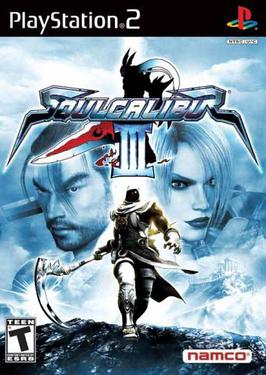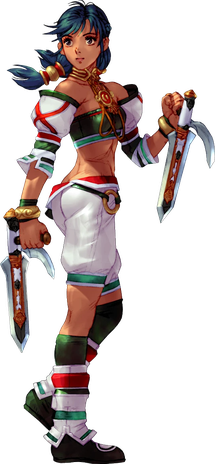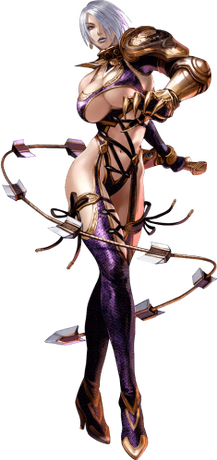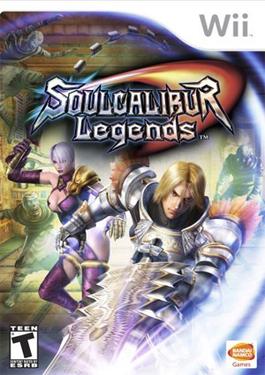
Soulcalibur is a 1998 fighting game developed by Project Soul and produced by Namco. It is the second game in the Soulcalibur series, preceded by Soul Edge. Originally released in arcades on July 30, 1998, it ran on the Namco System 12 hardware, and was ported to the Dreamcast console in 1999 with new features and improved graphics.

Soulcalibur II is a 2002 arcade fighting video game developed by Project Soul and published by Namco. It is the third installment in the Soulcalibur series of weapon-based fighting games as the sequel to Soulcalibur (1998). Originally intended to be released on Sega's NAOMI arcade board, the game was built on the Namco System 246 board before being ported to the PlayStation 2, GameCube, and Xbox home consoles in 2003.

Soulcalibur III is a 2005 fighting video game produced by Namco as a sequel to Soulcalibur II (2002) and the fourth installment in the Soulcalibur series. It was originally released for the PlayStation 2 and was followed by an improved arcade version, subtitled Arcade Edition, in 2006. It was the last Soulcalibur game to receive an arcade version and was also the last to be released by Namco as an independent company. Soulcalibur III received a mainly positive reception, and it was followed by a sequel under Namco Bandai Games, Soulcalibur IV (2008).

Talim is a character in the Soulcalibur of fighting games. Created by Namco's Project Soul division, she first appeared in Soulcalibur II and in most subsequent titles for the series. The Filipino daughter of a shaman and trained to be a Priest of the Wind, after encountering a fragment of the cursed sword Soul Edge she travels the world to return it to its rightful place. In English, Talim has been voiced by Julie Parker and Kira Buckland, while in Japanese she is voiced by Yukari Tamura.

Nightmare is a fictional character and the main antagonist in the Soulcalibur series of video games. The evil possessor of Siegfried Schtauffen's body, he later becomes an entity entirely separated from Siegfried in Soulcalibur III onward. Nightmare is the living incarnation of Soul Edge and a vessel for Inferno.

Isabella Valentine, commonly called Ivy, is a character in the Soulcalibur series of video games. Created by Namco's Project Soul division, she first appeared in the original Soulcalibur and its subsequent sequels, later appearing in various merchandise related to the series. She was voiced in Japanese by Yumi Tōma between Soulcalibur and Soulcalibur III, Kanako Tōjō between Soulcalibur Legends and Soulcalibur: Broken Destiny, and Miyuki Sawashiro in Soulcalibur V, and Soulcalibur VI; in English, she was voiced by Renee Hewitt in Soulcalibur II and Lani Minella for the remainder of the series.

Necrid is a character in the Soulcalibur series of weapon-based fighting games. Designed by comic book artist and toy designer Todd McFarlane through a collaboration with Namco, the character appeared in console ports of Soulcalibur II and later as part of an action figure set created by McFarlane Productions. Necrid's concept and physical build were outlined by Namco, who aimed to target North American audiences with the character, while McFarlane provided the character's design and name.
Soulcalibur is a weapon-based fighting game franchise developed by Bandai Namco Studios and published by Bandai Namco Entertainment.

Soulcalibur Legends is a 2007 action-adventure game developed by Project Soul and published by Bandai Namco Entertainment for the Wii. It is a spin-off of the Soulcalibur fighting game series and primarily features two of its most popular characters: Ivy and Siegfried.

Soulcalibur IV is a 2008 fighting video game developed by Project Soul and published by Namco Bandai Games for the PlayStation 3 and Xbox 360. As the fifth main entry in the Soulcalibur series, it marks a significant evolution in gameplay with enhanced graphics and new features compared to its predecessor Soulcalibur III (2005), including the introduction of three guest characters from the Star Wars franchise: Darth Vader, Yoda, and the Apprentice.

Sophitia Alexandra is a character in the Soulcalibur series of video games. Created by Namco's Project Soul division by designers Aya Takemura and Takuji Kawano, she first appeared in Soul Edge and its subsequent sequels, later appearing in various merchandise related to the series. A baker turned warrior from Athens fighting with a Xiphos and shield, Sophitia became involved in the search for the cursed sword Soul Edge at the behest of the god Hephaestus. The affair soon affected her other family members as well, including her sister, Cassandra, and later her children, Pyrrha and Patroklos.

Voldo is a character in the Soulcalibur series of video games. Created by Namco's Project Soul division, he first appeared in Soul Edge, and later in all games of the Soulcalibur series with the exception of Soulcalibur Legends. Servant to a long-dead weapons merchant, Voldo guards his treasure vault, attacking intruders while occasionally wandering out in search of a cursed sword named Soul Edge. Designed by Aya Takemura and Takuji Kawano around his dual hand katars, Voldo went through several designs, and in the early design phases was called "Psycho Murder". Having no spoken dialogue and instead strictly moaning or hissing deeply while fighting an opponent, his high mobility and flexibility influenced his outfits throughout the series, with several designed to take advantage of his unique traits.

The following is a comprehensive list of characters from the Soulcalibur series of video games, beginning with Soul Edge in 1995.

Taki is a character in the Soulcalibur series of video games. Created by designers Aya Takemura and Takuji Kawano of Namco's Project Soul division, she was introduced in Soul Edge, and later appeared in almost every subsequent sequel. Taki is a Japanese demon-hunting kunoichi and the greatest warrior of the Fu-Ma ninja clan. She is traveling the world on a quest to destroy the cursed sword Soul Edge. Taki has been featured as a player character in every main entry in the series up until 2012's Soulcalibur V, when her place was taken by her own young disciple named Natsu, but she returned in 2018's Soulcalibur VI. She has further appeared in all of Soulcalibur spin-off games, as well as in some other titles such as Namco × Capcom, The King of Fighters All Star, and Queen's Gate. She has been voiced in Japanese by Fujiko Takimoto until Soulcalibur III, and then by Sachiko Kojima and Nanako Mori in later games, while her English voice actors include Desirée Goyette and Cynthia Holloway.

Soulcalibur: Broken Destiny is a 2009 fighting video game in the Soulcalibur series, developed by Project Soul and published by Namco Bandai Games, for the PlayStation Portable. The game uses many of the features of Soulcalibur IV, including its character customization mode. One of the goals of the game is "to target beginners and novice players with Soulcalibur IV's content". It introduces two new characters to the series: Kratos from the God of War series and Dampierre, a new original character. In December 2023, the game was released digitally on PlayStation 4 and PlayStation 5.
Soulcalibur is a weapon-based fighting game series by Namco Bandai Games. The series revolves around a sword that, after years of bloodshed and hatred, gained a soul of its own, the Soul Edge, and the sword forged to counter it, Soulcalibur. The discography of the Soulcalibur series consists of two soundtrack albums for the first game in the series, Soul Edge, and one soundtrack album each for Soulcalibur, Soulcalibur II, III, IV, V and VI. None of the other games in the series have received a soundtrack release.

Soulcalibur V is a 2012 fighting video game produced by Namco Bandai Games for the PlayStation 3 and Xbox 360. As the sixth main installment in Namco's Soulcalibur series, Soulcalibur V serves as a follow-up to Soulcalibur IV (2008). It retains the weapon-based combat that characterizes the series while introducing a new protagonist, Patroklos, who aims to free his sister from a curse inflicted upon her by an ancient weapon. This installment marks the conclusion of the original Soul series timeline.

Marie-Laure Norindr, also known as Kayane, is a French esports player and journalist. She specializes in fighting games, in particular in the Dead or Alive, Soulcalibur and Street Fighter series, and has been playing competitively since 2001. Since then, according to Guinness World Records in 2011, she has been the most successful female participant in fighting game tournaments, especially regarding the Soulcalibur games. She is currently sponsored by Red Bull.

Soulcalibur: Lost Swords was a free-to-play fighting game distributed through PlayStation Network. Released in 2014, the game is based on Soulcalibur V and is strictly single-player. It uses the same weapon-based fighting system from previous games; however, several of the gameplay mechanics were changed, simplified or otherwise removed.
The 2018 Japanese Evolution Championship Series, commonly referred to as Evo Japan 2018, was a fighting game event held in Tokyo, Japan on January 26–28. As mentioned in its namesake, the event was the first Evo event to take place in Japan and outside of the United States. The event offered tournaments for various fighting games, such as Street Fighter V, Tekken 7, and Super Smash Bros. for Wii U. Over 5,000 people registered for the event with Street Fighter V and Tekken 7's entrant numbers being on par with their respective Evo 2017 numbers.


















